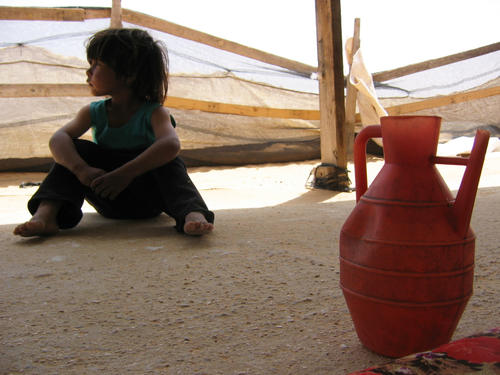Because Climate Change Affects Everyone
Joint environmental projects could lead to lasting peace in the Middle East, says Avi Gottlieb / Conference on July 15 at Freie Universität
Jul 13, 2015
Water scarcity, as here in the Negev desert in Israel, is one of the central problems in the Middle East. An equitable distribution of resources could contribute to peace in the region, says Avi Gottlieb.
Image Credit: Physicians for Human Rights, flickr / CC BY-SA 2.0
Climate change has been of major concern to Avi Gottlieb for decades. The Israeli professor of sociology at Tel Aviv University specializes in the development of sustainable environmental policies. In the context of the 50th anniversary of diplomatic relations between Israel and Germany, Gottlieb, with the support of the Alexander von Humboldt Foundation, organized a conference on sustainability and peace building in the Middle East. A panel of participating scientists will discuss these themes at the end of this conference, to be held at the Botanical Gardens. The public is invited to join the discussion.
“One of the biggest environmental problems facing the people in the Middle East is water scarcity,” Avi Gottlieb says. Apart from Lebanon, the water resources of every country in the region are very limited, he explains. However, the political climate today makes it difficult to find acceptable solutions to these kinds of common problems. “There is an atmosphere of distrust among different ethnic and religious groups, for example between Israelis and Palestinians. As such, it is not easy to bring people together, convince them to negotiate and cooperate, and find common solutions.” Nevertheless, the region might profit immensely if neighboring countries would cooperate in environmental projects, the scientist is convinced.
Cornerstone for Working Together
Joint policies to fight climate change, resource scarcity, and resource inequality throughout the region have the potential to secure peace, Gottlieb says. “Morever, agreements like these could lead to a political rapprochement on a more general level.” To show how countries in the region could profit from joint environmental policies, Gottlieb gives an example: “Israel currently gains drinking water by desalination and that uses up a lot of energy. The energy invested here is usually produced by burning fossils.” Instead, solar plants could be built in the Jordanian desert. “Israel could obtain energy from Jordan and in return provide Jordan with drinking water.”
Science Can Build Bridges
Common efforts to promote regional sustainability have the potential to build trust and bridge conflicts, Avi Gottlieb says. “Dwindling resources, extreme weather events, and climate change concern us all. In this context, science can offer a significant contribution to bring different nations and ethnic groups together and help them find common solutions.”
Urbanization Exacerbates Problems of Climate Change
In the conference, Gottlieb and his colleagues from Israel, Germany, and Canada will discuss ideas and research projects that are concerned with current and future issues related to regional environmental policies. “Especially the development of strategies for urban spaces is of utmost importance – not only in the Middle East but around the world,” Gottlieb says.
“Around fifty-five percent of the world’s population today lives in cities. And those cities are responsible for approximately seventy percent of global greenhouse gas emissions.” Due to the continuing and growing urbanization worldwide, these challenges will intensify in the next decades, Gottlieb says. “Furthermore, many cities are strongly affected by climate change since they tend to be located in specific areas – at ocean shores, for example, where seawater levels are rising as a result of climate change. This is just one of many problems that are best faced in a joint effort.”
Further Information
Panel Discussion: “Sustainability and Peace Building in the Middle East”
Time and Place
- Wednesday, July 15, 2015, 5 pm – 8pm
- Freie Universität Berlin, Botanisches Museum, | Großer Hörsaal, Königin-Luise-Straße 6-8, 14195 Berlin
- Registration not required, free admission
- The event will be held in English.
- Program (PDF)

